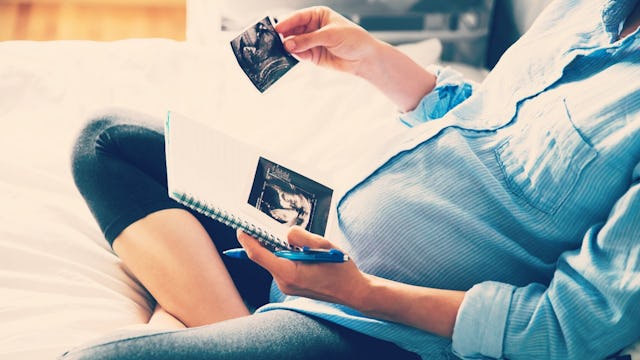Holding My Breath: What It's Like To Be Pregnant After Multiple Losses

I held my breath as the ultrasound technician moved her gooped-up wand over my belly. My sweaty hands firmly gripped the crinkly paper beneath my body.
With barely a hint that I was pregnant again — for the fourth time — the only indication that anything was actually growing inside me would soon appear on the grainy black and white image. Panic, as thick as a dense storm cloud, filled my heart, my gut, and my soul. I had been here three times before. It never ended well.
“You are either crazy or brave,” my dad offered half-jokingly when we announced this fourth pregnancy. I understood the love and support behind his words. Most days, I felt crazy. Often I wished for brave.
After each failed pregnancy, I said to my husband, “Never again.” At the beginning of each new pregnancy I told him, “This is the last time. If it doesn’t work, I’m done.” Yet something took hold of my deflated spirit and dragged me through it again and again. After the initial shock wore off, the grief released a bit of its nasty hold. In that moment, the tiniest shred of hope squeezed its way through the cracking grief-filled wall. The protection my mind tried earnestly to rebuild always crumbled a bit.
I thought of a childless life, and a new sorrow emerged. The chance to watch a human grow, learn, and flourish into a tiny offshoot of myself would never happen. I would never be a soccer (or swim, or dance, or band) mom. My happy daydreams taunted me: taking family vacations, teaching a child to read, and sitting nervously in a car with a nearly 16-year-old novice driver.
Yearning for the chance to guide a new human into this world, to teach her how to love, be compassionate, and contribute in a meaningful way to society, I just could not let the idea of a baby go. The final convincing argument each time planted firmly in my thoughts: I desired to know what it was like to someday be a grandmother.
My previous loss of a child at 20 weeks, learning of her fetal demise, fighting through a painful labor, watching her take her first breath and then a final one an hour-and-a-half later should have created a trauma profound enough to deter future pregnancies.
When the second pregnancy started out with a glimmer of hope but was quickly snuffed out at 9 weeks, I should have never again wanted to know that kind of pain. As I waited another 4 weeks for the natural miscarriage to happen, I should have hated the cruel universe too much to ever give it another chance to toy with my heart.
My third pregnancy, riddled with complications, subchorionic hemorrhages, a trip to the ER, and finally a devastating 12-week ultrasound revealing a beatless heart should have been the nail in the coffin. Enough is enough, I thought.
But it was not.
Each time, the protective wall went up; each time, it tumbled just a bit. The odds were against us, but I wanted to win.
When we learned of the fourth pregnancy, the familiar fear gripped my every thought. It invaded my hope for a successful pregnancy. Fighting vehemently against it, I pushed to the forefront any glimmer of positivity I could muster. My language changed.
“This time could be different,” I said to my husband.
Each day was a challenge. Presented with similar complications as before, we desperately fought each one. Facing weekly appointments, a multitude of ultrasounds, blood tests, and a team of doctors was brutal. The anxiety of when this pregnancy, too, would fail was merciless. Would she have the same fetal abnormalities as our first daughter? Would her heartbeat suddenly stop? Would her growth diminish slowly? Nightmares took hold of my slumber as anxiety gripped my daytime hours.
As we watched that technician take her ultrasound pictures, what we saw was remarkable. This baby moved far more than any of the previous ones. She danced and wiggled her tiny limbs. Her growth was on target. With each scan, we held our breaths, but when we left, we happily grasped tightly to the additional smidgen of confidence. As the wall of belief grew, the blockade of fear decayed. Through each obstacle we faced, and each skeptical comment we received from a doctor, we cherished the growth we felt with this pregnancy. The doctors were educated on the medicine, but they were naïve to the emotional knowledge we held.
By the time our rainbow baby joined our family, I knew we were crazy. The pregnancy played with our emotions, dragging us through the same mud we had visited three times before. Some days, I stayed home from work and cried on the couch. Other times, I forced my way through the hours at my desk, holding back tears through forced smiles. No sane human subjects themselves to this torment, unless the drive was so deep it hurt more not to.
At the same time, we were brave. The fear of losing another pregnancy should have been enough to stop me in my tracks. Yet I pushed back. Charging past a fear is brave, but doing so while knowing the devastating odds are stacked against you is absurd. The two coexisted and were codependent. One without the other provided little basis for trying again. But together, they brought us through the deepest, darkest, and most important journey of our lives. It is not a road for everyone, but for us it was everything.